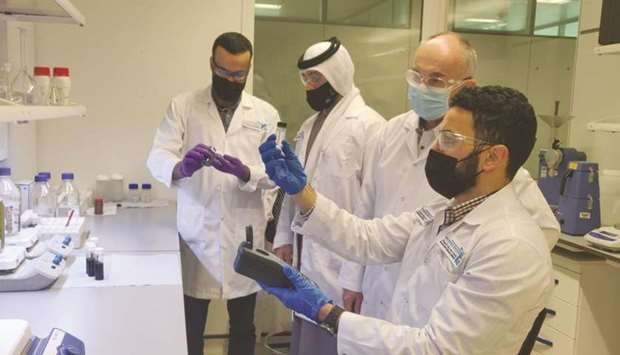Researchers from Qatar Environment and Energy Research Institute (Qeeri) and the College of Science and Engineering (CSE), both part of Hamad Bin Khalifa University (HBKU), have developed a new material for water treatment applications.
Carbide Derived Carbon (CDC) has the unique ability to efficiently remove and recover phosphate from treated water, while also removing micro-pollutants such as pharmaceuticals and endocrine disrupting compounds.
As per the Qatar National Vision 2030 and the Nationality Sustainable Development Strategy, there is a mandate for increased use of treated sewage effluent (TSE) and as such, there is a need to ensure that the TSE meets the necessary quality requirements. Pharmaceuticals proliferation in the environment is a problem for environmental and human health leading to issues in the ecosystem and potential for spread of antimicrobial resistance.
The new material, CDC has a much higher absorption capacity than other similar materials, which allows it to not just contain a larger amount of phosphates or other contaminants, but also to efficiently recover it. Studies show that it can absorb approximately 1.5 times the phosphate that existing commercial materials can.
Another key feature of CDC is that it could be used for treating the wastewaters not only from domestic waste but also from pharmaceutical plants and hospitals to mitigate the environmental and health risks.
The discovery is the result of work led by CSE student, Ismail Almanassra, who is pursuing his PhD under the joint mentorship of Qeeri’s Dr Viktor Kochkodan, senior scientist, and CSE assistant professor, Dr Tareq al-Ansari. The team also includes Qeeri scientist Dr Yehia Manawi, CSE professor, Gordon McKay, and other members from Qeeri’s Water Centre.
Almanassra said: “It is a real privilege to be supported by this incredible team of scientists at Qeeri and CSE and to work alongside them in these world-class facilities. I am thrilled to be learning from them and doing my part in contributing to the development of new materials that can lead to improvements in water treatment, and in turn have a positive effect on our environment.”
Dr Jenny Lawler, senior research director, Water Centre, added: “Our work has aimed to consistently push boundaries and develop better solutions for water treatment and reuse, not just in Qatar, but on a global scale. We are fully confident in the team and in the potential that our research on CDC is showing. We are now looking forward to further scale-up and development, with a view to eventual commercialisation to benefit society at large.”
A provisional US patent application was filed for the new material, and the research has been published in the Journal of Environmental Health Science and Engineering, and the Journal of Water Process Engineering.
Dr Marc Vermeersch, executive director, Qeeri said: “This latest innovation by the Water Centre holds immense promise. In line with Qatar National Vision 2030, Qeeri is committed to actively addressing the grand challenges relating to energy, water and environment in Qatar, the region, and the globe. Providing customised technological solutions to some of those issues is therefore a top priority.”
“We are extremely proud of this achievement by one of our very talented students under the mentorship of CSE faculty and Qeeri researchers. The outcome is a testimony to the great value of interdisciplinary collaborations and how they are leading to novel solutions of significant practical value to Qatar and the world,” Dr Mounir Hamdi, dean of CSE, added.

